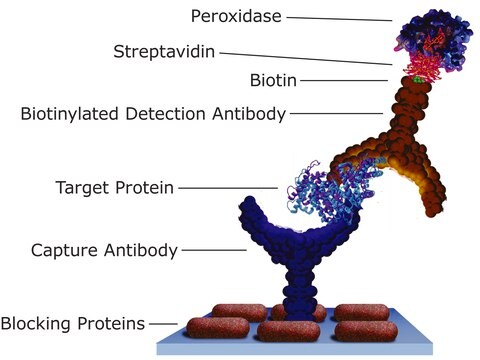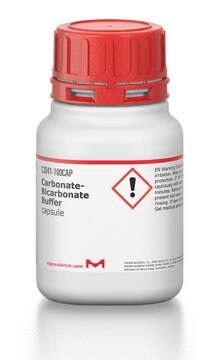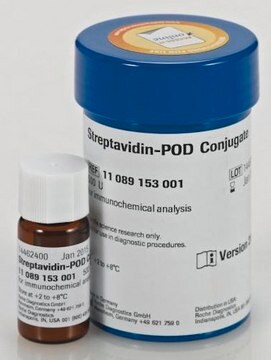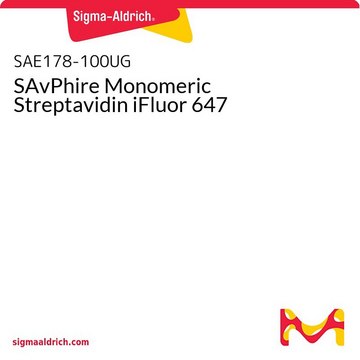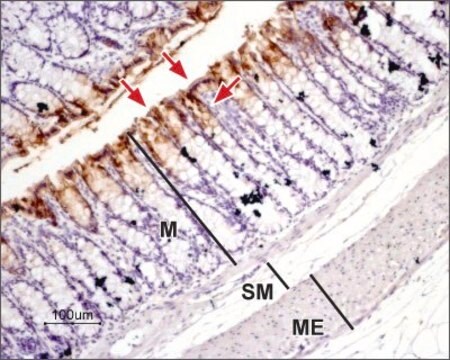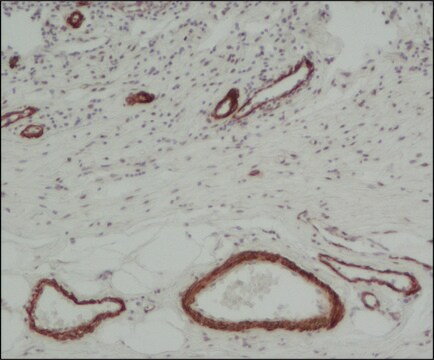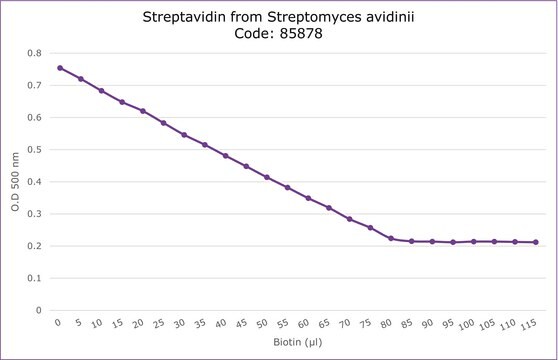S2438
Streptavidin−Peroxidase Polymer, Ultrasensitive
Sinonimo/i:
Highly sensitive Streptavidin−Peroxidase
Autenticatiper visualizzare i prezzi riservati alla tua organizzazione & contrattuali
About This Item
Codice UNSPSC:
12352202
NACRES:
NA.32
Prodotti consigliati
Forma fisica
buffered aqueous solution
Livello qualitativo
Condizioni di spedizione
wet ice
Temperatura di conservazione
−20°C
Descrizione generale
Activated streptavidin (SA) and horseradish peroxidase (HRP) are covalently conjugated to a polymer backbone. Multiple active biomolecules on each polymer chain increase the biotin binding capacity and amplify the peroxidase enzyme signal.
Specificità
Biotinylated biomolecules.
Applicazioni
Detection of biotinylated proteins and nucleic acids and other biomolecules.
Suitable use in Western blotting and ELISA and for detecting surface antigens in immunohistochemistry and immunocytochemistry.
Suitable use in Western blotting and ELISA and for detecting surface antigens in immunohistochemistry and immunocytochemistry.
Stato fisico
Supplied as an 1.0 mg/ml solution in 0.01 M sodium phosphate, 0.15 M sodium chloride, 50% glycerol, stabilizer and preservative, pH 7.4.
Codice della classe di stoccaggio
10 - Combustible liquids
Classe di pericolosità dell'acqua (WGK)
WGK 1
Punto d’infiammabilità (°F)
Not applicable
Punto d’infiammabilità (°C)
Not applicable
Certificati d'analisi (COA)
Cerca il Certificati d'analisi (COA) digitando il numero di lotto/batch corrispondente. I numeri di lotto o di batch sono stampati sull'etichetta dei prodotti dopo la parola ‘Lotto’ o ‘Batch’.
Possiedi già questo prodotto?
I documenti relativi ai prodotti acquistati recentemente sono disponibili nell’Archivio dei documenti.
I clienti hanno visto anche
Natalia Gruba et al.
International journal of molecular sciences, 20(7) (2019-03-31)
Kallikrein 13 (KLK13) was first identified as an enzyme that is downregulated in a subset of breast tumors. This serine protease has since been implicated in a number of pathological processes including ovarian, lung and gastric cancers. Here we report
Faruk Can et al.
Bioelectrochemistry (Amsterdam, Netherlands), 135, 107553-107553 (2020-05-23)
Applications of molecular techniques to elucidate identity or function using biomarkers still remain highly empirical and biosensors are no exception. In the present study, target-specific oligonucleotide probes for E. coli K12 were designed thermodynamically and applied in an electrochemical DNA
Jaclyn C Law et al.
Journal of immunology (Baltimore, Md. : 1950), 206(1), 37-50 (2020-11-20)
There is a pressing need for an in-depth understanding of immunity to SARS-CoV-2. In this study, we investigated human T cell recall responses to fully glycosylated spike trimer, recombinant N protein, as well as to S, N, M, and E
Stefan Kaluz et al.
Biochemical and biophysical research communications, 370(4), 613-618 (2008-04-12)
The hypoxia-inducible factor (HIF) activates transcription via binding to the highly variable hypoxia-responsive elements (HREs). All hypoxia-inducible constructs described to date utilize multimers of naturally occurring HREs. Here, we describe the rational design of minimal hypoxia-inducible enhancers, conceptually equivalent to
Mariana Resende et al.
Immunology, 159(1), 121-129 (2019-10-14)
The transcription factor hypoxia-inducible factor-1 alpha (HIF-1α) is a key regulator of the response and function of myeloid cells in hypoxic and inflammatory microenvironments. To define the role of HIF-1α in tuberculosis, the progression of aerosol Mycobacterium tuberculosis infection was
Il team dei nostri ricercatori vanta grande esperienza in tutte le aree della ricerca quali Life Science, scienza dei materiali, sintesi chimica, cromatografia, discipline analitiche, ecc..
Contatta l'Assistenza Tecnica.